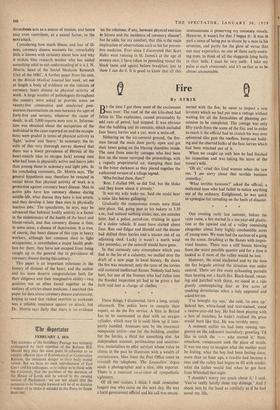Fire
By STRIX BY the time I got there most of the excitement was over. The roof of the old kiln-shed had fallen in. The explosions, caused presumably by odd cans of petrol, had stopped. It was obvious that the building and its contents, which included four heavy lorries and a car, were a write-off.
Slithering on the ice-covered ground, the fire- men forced the main door partly open and got their hoses going on the blazing shambles inside. The men from near-by cottages who had been first on the scene surveyed the proceedings with a vaguely proprietorial air, stamping their feet in the bitter darkness as they pieced together the authorised version of a village legend.
`Who fetched them, then?'
'Ron. I dialled 999, so did Ted, but the bloke said they knew about it already.'
'It was my wife woke me. Said she could hear a noise like horses galloping.' ' Gradually the momentous events were fitted into place. Sid, going past to his bakery at 3.30 a.m., had noticed nothing amiss; nor, ten minutes later, had a police patrol-car, cruising in quest of a stolen vehicle. It must have started about four. Ron and Edgar and Harold and the doctor had shifted three lorries and a tractor out of an adjoining shed. Lucky it wasn't a north wind like yesterday, or the sawmill Would have gone.
In that curiously cosy atmosphere which you find in the lee of a calamity, we mulled over the draft of a new page in local history. By dawn the fire was mastered; only the tyres of the lorries still nurtured ineffectual flames. Nobody had been hurt, but one of the firemen who had fallen into the flooded inspection pit had to be given a hot bath and lent a change of clothes.
These things, I discovered, have a long, untidy aftermath. The police have to compile their report, so do the fire service. A firm in Bristol has to be summoned to deal with an oxygen cylinder, which may (it is said) blow up if inex- pertly handled. Assessors sent by the insurance companies arrive—one for the building, another for the lorries, a third for something else. An independent assessor, pertinacious and unattrac- tive, materialises to offer services whose value to clients in the past he illustrates with a wealth of reminiscence. Men from the Post Office come to reinstall the telephone. The Loanishire Argus sends a photographer and a nice, able reporter. There is a constant va-et-vient of sympathetic sightseers.
Of all out. visitors I think I shall remember longest one who came on the next day. He was a local government official and his call was uncon- nected with the fire; he came to inspect a new lavatory which we had put into a cottage without waiting for all the formalities of planning per- mission to be completed. The cottage was only fifty yards from the scene of the fire, and in order to reach it the official had to crunch his way over splintered tiles past the roofless, burnt-out build- ing and the charred hulks of the four lorries which had been winched out of it.
When we caught up with him he had finished his inspection and was taking his leave of the tenant's wife.
'Oh sir,' cried this kind woman when she saw me, 'I am sorry about that terrible business yesterday.'
'What terrible business?' asked the official, a dedicated man who had failed to notice anything out of the ordinary. Enlightened, he was quick to apologise for intruding on the heels of disaster.
* *
One evening early last summer, before the rains came, a fire started in a ten-year-old planta- tion at the upwind end of a valley containing altogether about forty highly combustible acres of young trees. We soon had the nucleus of a gang on the scene, thrashing at the flames with impro- vised besoms. There was a stiff breeze blowing from the worst possible quarter and for a time it looked as if most of the valley would be lost.
However, the wind slackened and by the time the fire brigade arrived the situation was under control. There are few more exhausting pursuits than beating out a heath fire. Black-faced, sweat- ing and parched with thirst, we stood in a ride glumly contemplating four or five acres of smoking devastation when a lady appeared and asked for me.
'I've brought my son,' she said, `to own up.' Behind her, white-faced and tear-stained, stood a twelve-year-old boy. He had been playing with a box of matches; he hadn't realised the grass would burn like that. He was terribly sorry.
A moment earlier we had been vowing ven- geance on the unknown incendiary, growling 'I'd like to catch the — who started it.' Now, somehow, compassion took the place of wrath. It was too easy to imagine what the mother must be feeling, what the boy had been feeling since, more than an hour ago, a crackle had become a roar and the valley had begun to fill with smoke, what the father would feel when he got back from Whitehall that night.
'I shouldn't worry too much about it,' I said. 'You've really hardly done any damage.' And I shook him by the hand as cordially as if he had saved my life.










































 Previous page
Previous page